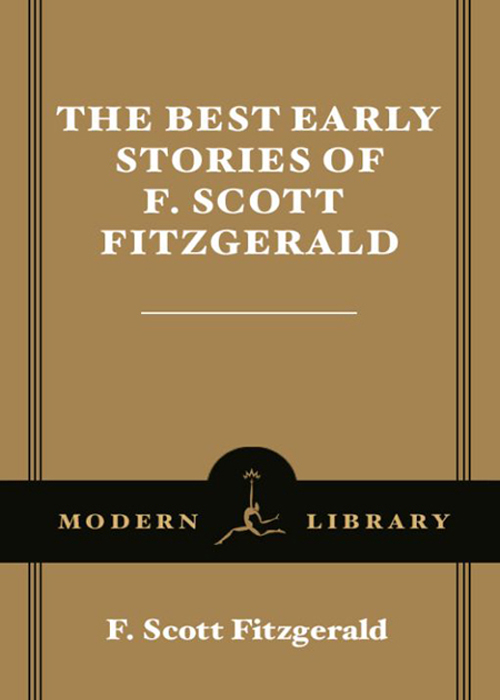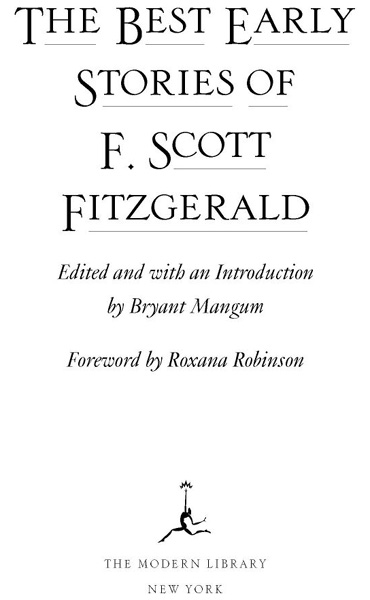The Best Early Stories of F. Scott Fitzgerald
Read The Best Early Stories of F. Scott Fitzgerald Online
Authors: F. Scott Fitzgerald
Tags: #Fiction


Table of Contents
THE DIAMOND AS BIG AS THE RITZ
FROM THE AMERICAN MAGAZINE, SEPTEMBER 1922
A NOTE ON THE TEXT
Nine of the stories in this volume have been reprinted from original first printings of the volumes in which they were first collected:
Flappers and Philosophers
(New York: Charles Scribner’s Sons, 1920),
Tales of the Jazz Age
(New York: Charles Scribner’s Sons, 1922), and
All the Sad Young Men
(New York: Charles Scribner’s Sons, 1926). Only minor typographical corrections have been made, three of them silent punctuation changes. In “May Day” one proper name has been changed and one word has been deleted. Both of these are noted within the text. For the sake of consistency the Roman numeral I has been removed from the beginning of “The Diamond as Big as the Ritz.” The text of “Winter Dreams” was reprinted from
Metropolitan Magazine
, December 1922. The stories are arranged chronologically by date of composition.

FOREWORD
Roxana Robinson
What is more beautiful than the landscape of loss? What is more heart-breaking, more haunting, more romantic?
F. Scott Fitzgerald saw the world as a place of unbearable beauty and unlimited glamour. He saw it as illuminated by the glory of the natural landscape, by the glitter of the people, and by the perilous, irresistible pull of love. He was a romantic, and the greatest of his writing is charged with feeling and haunted by a longing for something irretrievable.
In these stories, written between 1919 and 1923, when he was in his early twenties, we see him setting out on the mountain of his experience, choosing the veins of ore he would begin to mine. We know—as he does not—which ones will peter out and vanish, and which will deepen to become the mother lodes of his work. He writes, of course, about his generation, and about their experience, and of his own. He writes of their rebellion; he writes about a beautiful and impetuous young woman who seems the soul of this rebellion. He writes about wealth; he writes about religion; he writes about class; he writes about the great divide between the North and South. Some of these themes will be part of the great work that lies ahead, and some are part of the great work in this collection. All of them are set against that wide, murmuring landscape of loss.
The rebellion of Fitzgerald’s generation is shown through various means, and religion and the young woman both play a part in it. The young woman appears in almost all of these stories, and is, in her earliest incarnation, “The Flapper.” Frivolous, saucy, and impetuous, she was an innovation, and utterly unlike her literary contemporaries. Ellen Olenska from
The Age of Innocence
, published in 1920, was also beautiful and high-spirited, but she was deeply respectful of society’s rules, and suffered when these rules were broken. The Flapper flouted rules with impunity. She scorned chaperones, curfews, long skirts, maidenly virtue, and seemly behavior. Suddenly it was hard to tell a nice girl from the other kind.
Fast cars, rowdy drinking, wild dancing, and the bobbing of hair were all part of the roil of social revolution. It’s hard now to imagine how shocking bobbed hair was, but at that time, a woman’s hair was never cut. A young girl wore her hair down in braids until she was old enough to put it up. The heavy, majestic burden, pinned discreetly aloft, was a declaration of womanhood, holding the promise of hidden sexuality. A woman’s hair was her crowning glory, and a source of pride. (When my great-grandmother had scarlet fever, the doctor ordered her to cut off her ankle-length locks. She refused, instead coiling her hair on the floor beneath her bed. Death, apparently, was preferable to shearing, though she survived.)
The wild women of the 1920s cared for none of this. They wore their hair short and swingy, with thick bangs and saucy spit curls, and they ignored the shock waves rippling through the ranks of stolid matrons. “Bernice Bobs Her Hair” is about many things—women’s friendship, and social conventions, and ways in which a young woman might present herself to the world—but it’s also about the social risk and private daring entailed in “bobbing.”
Some of the Flappers are northern and some southern: the differences between the cultures were significant to Fitzgerald, whose father was from an old Maryland family. Fitzgerald was stationed in Alabama during the War, where he fell in love with the famously wild Zelda Sayre, of Montgomery. Zelda’s incandescent personality illuminates many of Fitzgerald’s women, though another important model for them was Ginevra King, a northerner, who was the object of an earlier, unrequited love. The North and South were potent presences in his work, and at times they nearly dominated the narrative.
Beautiful and hallucinatory, “The Ice Palace” tells of the southern girl Sally Carrol, who comes from a “languid paradise of dreamy skies and firefly evenings . . . [one of the] soft-voiced girls, who were brought up on memories instead of money.” When she visits Harry, her fiancé, in Minnesota, Sally Carrol encounters a new world—a bleak frozen landscape dotted with isolated farmhouses and blanketed in snow.
Describing the South, Fitzgerald’s tone is ironic and patronizing; he both articulates and disparages its easy charms. But when he turns to the North his tone becomes earnest, acquiring richness and authority: this may be the first emergence of Fitzgerald’s mature voice. Powerful, dark, and intense, it is superb writing.
There was no sky—only a dark, ominous tent that draped in the tops of the streets and was in reality a vast approaching army of snowflakes—while over it all, chilling away the comfort from the brown-and-green glow of lighted windows and muffling the steady trot of the horse pulling their sleigh, interminably washed the north wind. . . . She thought again of those isolated country houses that her train had passed, and of the life there the long winter through—the ceaseless glare through the windows, the crust forming on the soft drifts of snow, finally the slow, cheerless melting, and the harsh spring . . .
Visiting the Ice Palace, Sally Carrol becomes separated from Harry, and wanders alone through the black and chilling halls. In the deep silence she stumbles finally to a halt, overtaken by ecstatic terror. This is her introduction to the true nature of the North, which, she now understands, is beyond her—endless, ancient, and implacable. After her rescue, Sally Carrol flees to the easy life of the South, where the moment of fear and transcendence will never be repeated, and where such demands are not made upon the soul. The South is a pleasant place, but the North, Fitzgerald tells us, is one of dark magnificence. It is this sense of brooding nobility—as well as Fitzgerald’s passionate, incantatory voice—that overshadows the human characters and dominates this story.
For all her unconventional ways, Zelda refused Fitzgerald, at first, on very conventional grounds: financial ones. The beautiful young women in Fitzgerald’s work are often wealthy, or aspirants to wealth. Money held a deep and ambivalent fascination for the author, who had grown up poorer than his neighbors. In St. Paul, his family lived modestly among the very rich, and Fitzgerald went to school and college with their sons. He had seen the rich from very close, but always from below. Money played a powerful part in his world and in his writing, and its influence was something he explored, in ways increasingly subtle and complex.
In the light and frothy entertainment “The Offshore Pirate” wealth is seen as benign. The very rich are very benevolent here, and the consequences of wealth are happiness. The saucy Flapper, who stamps her foot and will not do as she’s told, meets her match in a dashing young Lochinvar, and by the happy ending everyone is rich and in love. The counterpart to this romantic diversion is the dazzling satiric fantasy “The Diamond as Big as the Ritz.” In this moral fable Fitzgerald both revels in the notion of great wealth and excoriates those who possess it. Here the rich are outrageously corrupt, stupefyingly wealthy, and utterly lacking in humanity. Everyone, including the narrator, is consumed by avarice: it is an extravaganza of dreadfulness. The height of depravity occurs when the host, in a moment of apocalyptic hubris, offers God a bribe. The ending is happy in that the monstrously swollen, overblown fantasy has exploded. Everything has been destroyed, everyone reduced to human proportions, flawed and struggling. This is a playful but savage attack on the influence of affluence, something which would continue to be the subject of Fitzgerald’s scrutiny. He would use it as a kind of awful magnifier to focus on mankind’s basest instincts.
Religion is at the core of the stories that bracket this collection, “Benediction” and “Absolution.” Fitzgerald was raised a Catholic, and the Church was initially important in his work—a worldly Jesuit plays a significant part in
This Side of Paradise
—but the religious presence would fade. A powerful sense of its diminishment prevails in the masterly “Absolution.”
Rudolph, a young boy from the working class, begins to neglect his religious obligations. His father discovers this and punishes him. The details of the beating, of the house, the narrow hallway, the timid mother, are all rendered with heart-stopping precision, but this is more than an intimate familial struggle. It is set against the larger backdrop of the mysteries of religious experience, with its combination of stricture and sensuality, ecstasy and abstraction. When Rudolph visits the priest at home to discuss his sins, little help is offered by this servant of the Church. The priest’s mind is giving way. He can no longer withstand the insistence of the beautiful, irresistible world—of the body, of the senses, of another kind of ecstasy.
Outside the window the blue sirocco trembled over the wheat, and girls with yellow hair walked sensuously along roads that bounded the fields, calling innocent, exciting things to the young men who were working in the lines between the grain. . . . For five hours now hot fertile life had burned in the afternoon. It would be night in three hours, and all along the land there would be these blonde Northern girls and the tall young men from the farms lying outside beside the wheat, under the moon.
This paean to the sensual, physical world could hardly be more vivid or heartfelt, nor could it offer a more absolute antithesis to the incoherent thicket of philosophical abstractions surrounding Rudolph. Religion seems here to lose its centrality and purpose, yielding to something more immediate, more tangible and more real.
But perhaps the most powerful and familiar aspect of the work represented in this collection is neither a character nor a subject but a state of mind. In the beautiful “Winter Dreams,” Fitzgerald creates an elegiac realm which he will establish as his own: this is the landscape of loss.
Dexter, the protagonist, lies on a raft, in a lake, at night.
There was a fish jumping and a star shining and the lights around the lake were gleaming. Over on a dark peninsula a piano was playing the songs of last summer . . . and because the sound of a piano over a stretch of water had always seemed beautiful to Dexter he lay perfectly quiet and listened.
The tune the piano was playing at that moment had been gay and new five years before when Dexter was a sophomore at college. They had played it at a prom once and because he could not afford the luxury of proms in those days he had stood outside the gymnasium and listened. The sound of the tune and the splash of the fish jumping precipitated in him a sort of ecstasy and it was with that ecstasy he viewed what happened to him now. The ecstasy was a gorgeous appreciation. It was his sense that, for once, he was magnificently atune to life and that everything about him was radiating a brightness and a glamor he might never know again.
When Fitzgerald wrote this he was twenty-six, married to his adored Zelda and the father of a ten-month-old daughter. His first novel had received critical acclaim and commercial success. He was rich, beloved, and successful. Didn’t the world lie easily within his grasp? Didn’t he have every cause for jubilation?
Perhaps. But instead of jubilation, Fitzgerald’s twenty-six-year-old voice is full of longing. The gorgeous moment, even as he celebrates it, is permeated by the sense that this ecstasy may be the last he will ever savor. The sense of loss, its mysterious potency and its presence, deep within the heart, provides a dark and steady undertow within Fitzgerald’s work. His gaze was directed backward. It was as though he sat in a carriage watching life unrolling steadily behind him, receding, in all its beauty and complexity, into the blue distance; held up, as it was vanishing, to his musing scrutiny. His task was not to chronicle the splendor of what was to come, but to record the loveliness of what was gone.
Maybe all great fiction is about loss. Maybe the purpose of great fiction is to reveal the chasm that lies between ourselves and the exquisite vanished world that—we realize now—we so cherished. Certainly that is what the great fiction of F. Scott Fitzgerald does, and it does so with such elegance, such strength and tenderness and intimacy, that it seems as though each moment he creates is one that we have lived through. Each one strikes deep into us, reverberant and powerful and sobering, like the sound of a gong, recalling to us something we once knew.
ROXANA ROBINSON has written three story collections,
A Glimpse of
Scarlet, Asking for Love,
and, most recently,
A Perfect Stranger
. She is also the author of three novels,
Summer Light, This Is My Daughter,
and Sweetwater, and a biography of Georgia O’Keeffe. She has received fellowships from the Guggenheim Foundation, the National Endowment for the Arts, and the MacDowell Colony. Robinson’s fiction has appeared in
Best American Short Stories, The Atlantic, The New Yorker,
Harper’s, Daedalus,
and
Vogue
. She lives in New York City and Maine.